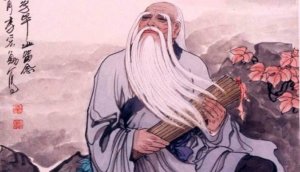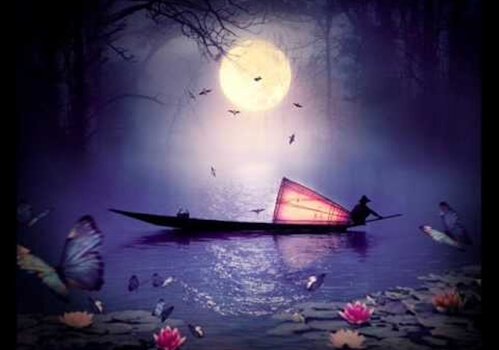5 Lao-Tze Quotes to Reflect On

Lao-Tze is a Chinese word that means “old master”. It is also the name of a philosopher and thinker who probably lived in the 7th century. He is credited with writing the “Tao Te Ching”, but he is also a figure shrouded in mystery. In fact, many people doubt that he ever really existed.
What we know for sure is that an intellectual legacy under the name “Lao-Tze” made it to this day and age. It may not matter if it was one man or many. What is important is that he passed on lessons that are still relevant thousands of years later.
With good words, one can negotiate, but to make yourself great, good works are required
-Lao Tze–
We must give credit to Lao Tze for a legacy of wisdom. His thoughts reflect many of the essential principles of eastern culture. They are an appeal for good judgment, simplicity, and serenity. They exalt intelligence and temperance. Here we will share five of his wonderful sayings and aphorisms.
1. Happiness in the eyes of Lao Tze
Lao-Tze reflected on happiness. From his point of view, and many centuries before the age of consumerism, eastern philosophy separated happiness from possessions. One timeless quote on the subject says: “He who is not happy with a little will not be happy with a lot”.

This saying places happiness within a framework where it doesn’t matter what one has. Having little is not the same as unhappiness. Having a lot doesn’t equal happiness. We achieve well-being through things that have nothing to do with possessions. Happiness and unhappiness are found simply in being, not in what is surrounding us.
2. On rigidity and flexibility
Many people talk about being firm and strict as great virtues. However, this perspective may be forgetting the logic of being alive. Where there is life, there is change. And change demands adaptation. Instead of being like steel, life requires us to flow like water.
Lao-Tze left us another wonderful thought on the subject: “In life, man is flexible and he evolves. At the moment of death, he is stiff and unchangeable. Plants in the sun are flexible and fibrous but they seem dry and breakable. That is why flexibility and elasticity are associated with life, and stiffness and unchangeability go hand-in-hand with death”.
3. To love and to be loved
Long before humanist doctrine appeared and became popular, Lao-Tze offered a vision of love as power. He highlighted the deep difference between loving and being loved in one of his sayings: “To be deeply loved gives you strength, while deeply loving someone gives you courage”.

There is a subtle but important difference between strength and courage. We can define strength as the physical or subjective ability to do something. Courage, on the other hand, refers to bravery and the choice to do it. Strength is being able to, courage is wanting to. There is a whole emotional array of difference between one concept and the other. While wanting to leads to being able to, the opposite isn’t necessarily true.
4. Desire and frustration
Asians emphatically reject desire. They consider it the source of undue suffering. Their philosophy focuses more on the ability to give up what you have before looking for that which you desire. True to this philosophy, Lao-Tze offers these words:
“He who does not desire does not become frustrated. And he does not become frustrated does not become corrupted. A truly wise man waits in the stillness while everything happens. Desire does not dictate anything. In this way, peace and harmony have their place and the world follows its natural course.”
For Westerners, this idea seems almost absurd. In Western societies, ambition is a source of growth and progress. Nevertheless, our current reality shows us that desire can be a bottomless pit that is never satisfied.
5. To fight or to retreat
The East is the home of martial arts. Paradoxically, the majority of martial arts instruct practitioners to avoid combat whenever possible. The greatest wisdom that war provides is precisely that we must try our best to avoid it. Lao-Tze’s philosophy affirms this idea with this saying: “The book of strategy says: do not provoke a fight, accept it; it is better to retreat a meter than advance a centimeter”.

Lao-Tze’s thinking is, without a doubt, a great gift of wisdom to the world. Not only does it offer a guide for the art of living well, but it uses the language of poetry to share its lessons. We have much to learn from this thousand-year-old character, who seems more alive today than ever before.
Lao-Tze is a Chinese word that means “old master”. It is also the name of a philosopher and thinker who probably lived in the 7th century. He is credited with writing the “Tao Te Ching”, but he is also a figure shrouded in mystery. In fact, many people doubt that he ever really existed.
What we know for sure is that an intellectual legacy under the name “Lao-Tze” made it to this day and age. It may not matter if it was one man or many. What is important is that he passed on lessons that are still relevant thousands of years later.
With good words, one can negotiate, but to make yourself great, good works are required
-Lao Tze–
We must give credit to Lao Tze for a legacy of wisdom. His thoughts reflect many of the essential principles of eastern culture. They are an appeal for good judgment, simplicity, and serenity. They exalt intelligence and temperance. Here we will share five of his wonderful sayings and aphorisms.
1. Happiness in the eyes of Lao Tze
Lao-Tze reflected on happiness. From his point of view, and many centuries before the age of consumerism, eastern philosophy separated happiness from possessions. One timeless quote on the subject says: “He who is not happy with a little will not be happy with a lot”.

This saying places happiness within a framework where it doesn’t matter what one has. Having little is not the same as unhappiness. Having a lot doesn’t equal happiness. We achieve well-being through things that have nothing to do with possessions. Happiness and unhappiness are found simply in being, not in what is surrounding us.
2. On rigidity and flexibility
Many people talk about being firm and strict as great virtues. However, this perspective may be forgetting the logic of being alive. Where there is life, there is change. And change demands adaptation. Instead of being like steel, life requires us to flow like water.
Lao-Tze left us another wonderful thought on the subject: “In life, man is flexible and he evolves. At the moment of death, he is stiff and unchangeable. Plants in the sun are flexible and fibrous but they seem dry and breakable. That is why flexibility and elasticity are associated with life, and stiffness and unchangeability go hand-in-hand with death”.
3. To love and to be loved
Long before humanist doctrine appeared and became popular, Lao-Tze offered a vision of love as power. He highlighted the deep difference between loving and being loved in one of his sayings: “To be deeply loved gives you strength, while deeply loving someone gives you courage”.

There is a subtle but important difference between strength and courage. We can define strength as the physical or subjective ability to do something. Courage, on the other hand, refers to bravery and the choice to do it. Strength is being able to, courage is wanting to. There is a whole emotional array of difference between one concept and the other. While wanting to leads to being able to, the opposite isn’t necessarily true.
4. Desire and frustration
Asians emphatically reject desire. They consider it the source of undue suffering. Their philosophy focuses more on the ability to give up what you have before looking for that which you desire. True to this philosophy, Lao-Tze offers these words:
“He who does not desire does not become frustrated. And he does not become frustrated does not become corrupted. A truly wise man waits in the stillness while everything happens. Desire does not dictate anything. In this way, peace and harmony have their place and the world follows its natural course.”
For Westerners, this idea seems almost absurd. In Western societies, ambition is a source of growth and progress. Nevertheless, our current reality shows us that desire can be a bottomless pit that is never satisfied.
5. To fight or to retreat
The East is the home of martial arts. Paradoxically, the majority of martial arts instruct practitioners to avoid combat whenever possible. The greatest wisdom that war provides is precisely that we must try our best to avoid it. Lao-Tze’s philosophy affirms this idea with this saying: “The book of strategy says: do not provoke a fight, accept it; it is better to retreat a meter than advance a centimeter”.

Lao-Tze’s thinking is, without a doubt, a great gift of wisdom to the world. Not only does it offer a guide for the art of living well, but it uses the language of poetry to share its lessons. We have much to learn from this thousand-year-old character, who seems more alive today than ever before.
This text is provided for informational purposes only and does not replace consultation with a professional. If in doubt, consult your specialist.







